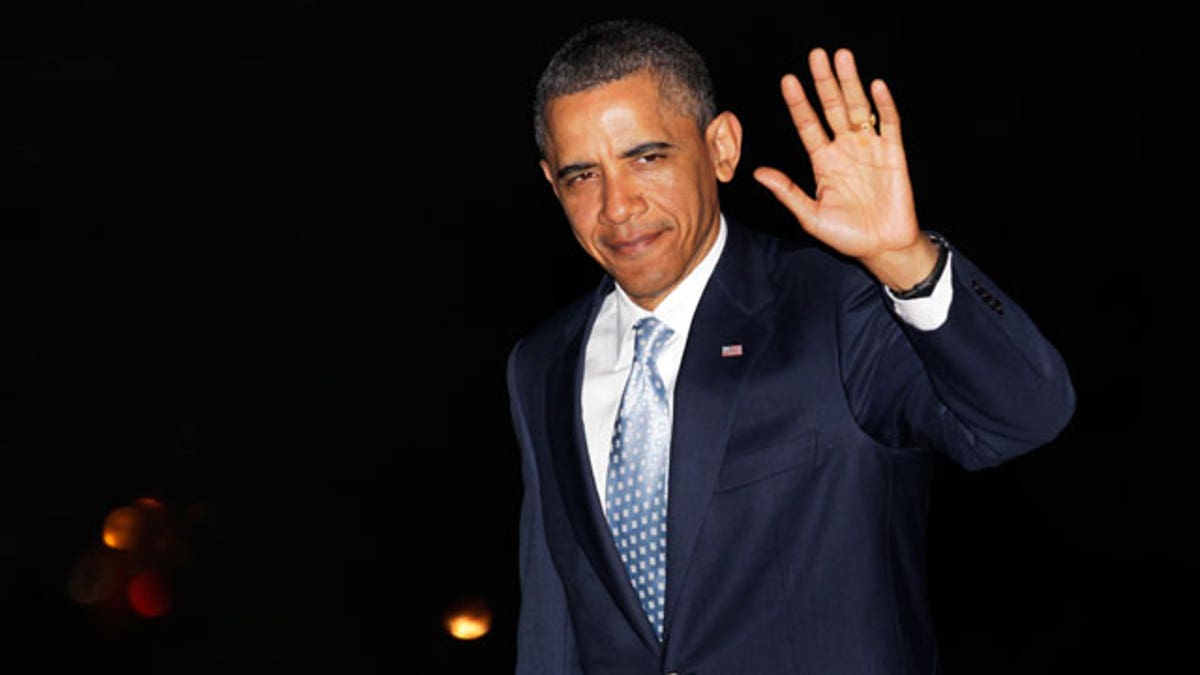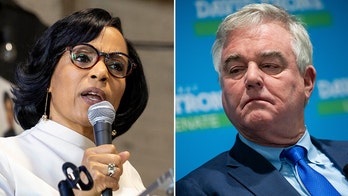
May 11: President Obama waves to media as he walks from Marine One to the White House, in Washington, as he travels from Texas. (AP)
As the Treasury Department announced its collecting more tax revenue but still not enough to reduce the federal budget deficit below $1.4 trillion for the year, President Obama is meeting with congressional Democrats to develop a long-term approach to cutting the deficit.
The get-together Wednesday on White House grounds with the entire Democratic caucus is the first of two gatherings the president has called as talks stall over where to find compromise in reducing the budget. Obama is scheduled to meet Thursday with congressional Republicans.
Obama's involvement adds a sense of urgency to the discussions as the clock ticks for Congress to increase the nation's credit line before defaulting on its debt. The Aug. 2 deadline to increase the debt limit has been pushed back already by Treasury Secretary Tim Geithner, who shifted around resources to prevent the U.S. from hitting its debt ceiling and potentially losing its global credit rating.
Vice President Biden had been the administration's point man on budget talks and on several occasions had huddled with negotiators from the House and Senate to find ways to reduce spending by identifying domestic programs that both sides agree can be cut.
But after meeting with congressional negotiators for two hours on Tuesday, Biden said the top House and Senate leaders may have to get involved to close any deal.
"Whether we get to the finish line with this group is another question," he said. Biden is scheduled to meet with negotiators again on Thursday.
Obama spokesman Jay Carney said Biden's call for backup is not a sign of exasperation. But as both sides say they don't want to play games with the debt ceiling, the two remain very far apart on how to stop the debt spiral.
The president isn't ready to abandon a "balanced approach" that presumably would include both spending cuts and tax increases, Carney said, and wants everyone to share the prosperity and the burden associated with long-term debt.
Democrats insist that any burden-sharing should start with an end to tax subsidies for the nation's five largest oil companies. They also reject Republican Budget Committee Chairman Paul Ryan's fixes to Medicare and Medicaid, which they say is unduly harsh on seniors and the poor.
The oil companies "are enjoying far greater profits than we've seen in more recent years and, in fact, they're continuing to take advantage of this tax break to the tune of over $2 billion a year," said House Democratic Caucus Vice Chairman Xavier Becerra. "At the same time Republicans say that seniors in America must see their health care costs rise under Medicare because as they say, the country is broke. America is not broke. Its priorities just aren't in order."
"The Republican budget that passed the House was a totally lopsided approach. It was anything but a balanced approach," added Rep. Chris Van Hollen, D-Md. "It did not ask for any type of shared sacrifice. In fact, what it did, as my colleagues have said, was say to seniors, we're going to end the Medicare guarantee and we're going to say you've got to go into the private insurance market where costs will rise very rapidly, and by the way seniors, you've got to eat those additional costs."
For their part, Republicans are opposed to any tax increases and are demanding steep spending cuts before holding a vote on increasing the debt limit.
"The point we're making is, look, the debt ceiling will have to be raised and we have to cut spending. It's pretty simple. You really can't tax your way out of this problem. We're saying for a dollar of debt increase, we got to cut a dollar of spending," Ryan, R-Wis., told Fox News on Wednesday,
"The Democrats have been unable to present a budget because the big spenders in their caucus cannot support a plan that gets the job done and that the American people will support," said Sen. Jeff Sessions, R-Ala., chairman of the Senate Budget Committee.
"American families should not be punished for the sins of Washington. According to the (Congressional Budget Office), we are going to spend $45 trillion over the next 10 years. Reports suggest that the Senate Democrat plan ... will cut, or save, just $2 trillion," Sessions said.
Republicans say they want "trillions, not billions" cut from the spending side of the ledger. That means if the $14.3 trillion debt ceiling is increased by $2 trillion, as it was last year, spending cuts of the same amount would have to be included.
"Anything else is not serious," said House Majority Leader Eric Cantor.
Fox News' Chad Pergram contributed to this report.




